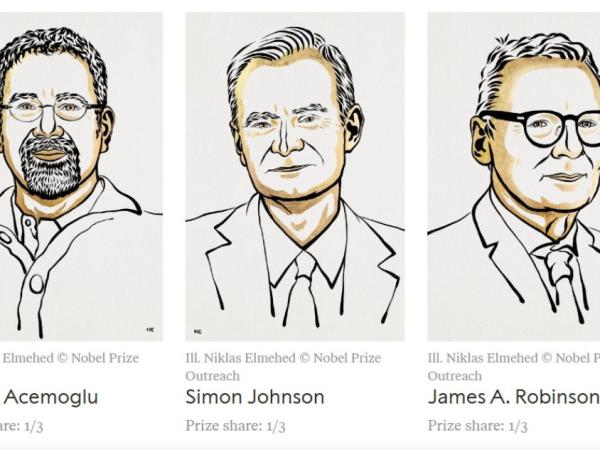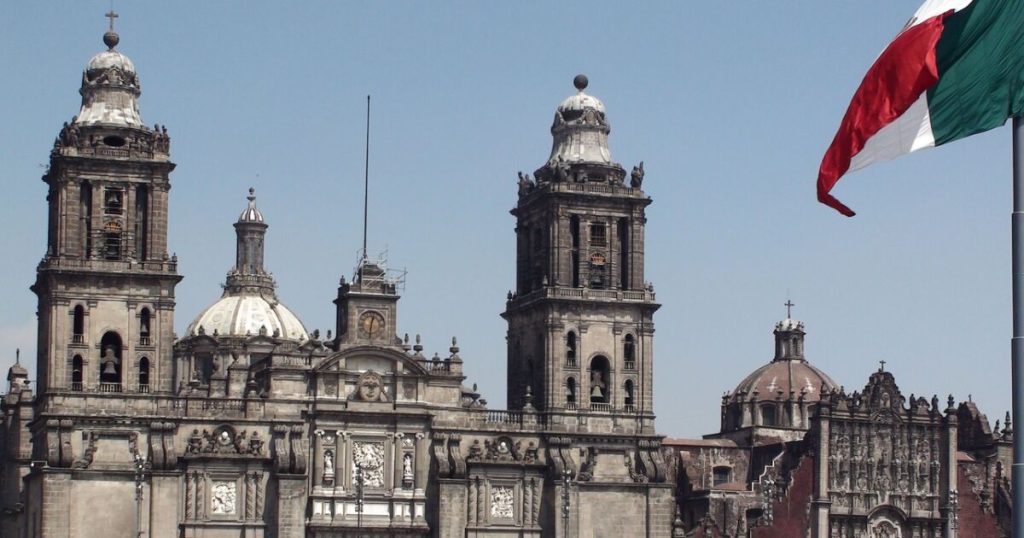This week begins with the news and reactions to the 2024 Nobel Prize in Economics, which the Royal Swedish Academy of Sciences awarded last Sunday – October 14 to three economists who have dedicated their careers to demonstrating how good governance and strengthening institutions translates in solid economic development and a stronger drive to overcome poverty and inequalities.
Daron Acemoglu and Simon Johnson of the Massachusetts Institute of Technology and James A. Robinson of the University of Chicago, in the United States, were awarded the award in Economic Sciences for their “studies on how institutions are formed and how they affect prosperity.” .
More news: Colombia could be like the US but ‘institutions do not allow it’
Among the arguments presented by the jury, Acemoglu, Johnson and Robison demonstrated the importance of social institutions for the prosperity of a country and why those populations, cities or groups with a deficient rule of law and institutions that exploit the population do not generate growth or positive changes; which in his concept will help improve society in the future.
Jakob Svensson, president of the Economic Sciences Prize Committee, added that thanks to the contributions of these three economists, it was possible to carefully review the process of colonization of Europeans around the world, which did not happen in the same way in all cultures. to which they arrived, and how since then, government policies have ended up in more prosperous nations than others.
Nobel Prize
EFE
“Reducing the vast income differences between countries is one of the greatest challenges of our time. The winners have demonstrated the importance of social institutions to achieve this,” said Svensson, during the award ceremony.
In that sense, they made it clear that thanks to the research of Daron Acemoglu, Simon Johnson and James Robinson, today it is clear that when there are inclusive institutions, this resulted in a generally prosperous population; while if governments are generated with colonial institutions or with little participation, in the future dependence on extractive industries and little growth will be observed.
The Colombia chapter
Although the publications of the 2024 Nobel Prize in Economics address the economy At the global level, one of the three experts has reviewed the Colombia case carefully, even going so far as to use it as an example in several works such as “The Narrow Corridor” or “Why Nations Fail,” warning that scourges such as the absence of the State and violence have made the fight against poverty difficult, mainly in the most remote regions.
Also read: Three researchers win the Nobel Prize in Economics for their work on inequality
This is James A. Robinson, who in his resume stands out, among many things, for being an Honoris Causa Doctor and a professor at international summer schools at the Universidad de los Andes in Colombia, and in papers such as “La Poverty in Colombia ”, warns that in Colombia there are “powerful forces” that have made this country remain poor and violent, while putting on the table several paths to solve.
“For most of the country’s history, the majority of Colombians have lived in absolute poverty and have been plagued by violence and insecurity. My argument is that the extent and persistence of poverty and violence in Colombia “They are a consequence of the extractive facets of political institutions,” he says in his postulate.
To better understand Robison’s point, we must note that when he talks about “institutions,” he is not referring to entities such as the Presidency, ministries or departments; but rather the set of policies that define the course of a State in a certain matter, both by action and by omission of those who define the social institutions and the responses or behaviors of its citizens.

James Robinson, Nobel Prize in Economics 2024.
EFE
Economists consulted by Portafolio added that the work of the awarded the 2024 Nobel Prize in Economics, has to do with developing countries, including Colombia, in particular those countries that did not have or have not had, at the beginning of their economic development, inclusive institutions that would allow the product of activities to be redistributed economic, but they concentrated them in a colonial power that extracted it from the country.
Now, with respect to the works of James A. Robison only on the national context, for José Manuel Restrepo, professor at the EIA University, the most important thing is his messages regarding the effort that must be made to strengthen those social institutions that have been object of study and comments for this analyst.
“For example, political parties are very weak. The reality of clientelism It greatly weakens institutions, so strong institutions are needed. It also tells us that it needs an institutional framework that is capable of confronting monopolies, of attacking that monopolistic power that has also become entrenched in our society in various scenarios. That there be a greater capacity for the provision of public goods by the State,” he explained.
In his texts, the now Nobel Prize winner has also reviewed problems such as violence and its relationship with power, and how this mix has translated into displacement and the creation of pockets of poverty in the regions. Likewise, together with the equally award-winning Daron Acemoglu, they raise the analogy of the “narrow corridor”, which for them is “a space of confrontation and cooperation between the State and society, an endless, narrow process that is never permanently resolved.”
You may be interested in: Ecopetrol liquidates subsidiary created to market electric energy
Jorge Amorocho, professor at the Universidad del Rosario, highlights Robinson’s work, pointing out that he is one of the modern authors of advanced and multifaceted content in which his inclination for academics and the study of cases in each one is greatly appreciated. of their appraisals. Likewise, he reiterated that he is an economist who did not remain solely in the doctrinal and demonstration approach to economics. mathematics, neither of variables, nor of demonstrations of hypotheses, but rather it went to real facts.”
“It would be very important for the current administration or those to come to collect the fruit of that experience and that research that has been done in the pragmatic field, especially what the scheme of inequality, violence and poverty is in Colombia and how from the identification It is clear that the problem comes from the periphery, look for appropriate solutions from the center,” he concluded.

Winners of the 2024 Nobel Prize in Economics.
EFE
James A. Robison, recognized that Colombian institutions “slowly” have become less extractive over time, due to elite attempts to counteract some of the internal contradictions of the coexistence of extractive and inclusive institutions, and while this has resulted in decreases in poverty and violence, as well as in a gradual modernization of the country; There are still many challenges to overcome.
Various contributions
Through a statement, the Universidad de los Andes welcomed the award received by James Robinson, highlighting that he has been a fundamental pillar in the training of many Colombian economists, who, after being mentored by him, are today his collaborators.
Leopoldo Ferguson, professor of Economics from Los Andes and who also has been director of the Center for Economic Development Studies (Cede), added that “the contributions of the three have not only been interesting or useful for the academic field, but with their discussions on the causes that explain why some countries have less material well-being than others, have had an important influence on other audiences as leaders and opinion-makers, in the way in which people discuss issues.”
Ferguson said that “for example, with his book Why Countries Fail, which was one of the best sellers at the time and highly awarded, he has motivated a debate about the policies that can be taken and the circumstances to improve the well-being of people.” people in the world.”
This University also spoke about Acemoglu and recalled that he has been visiting the International Summer School in Economics and was in Colombia in 2022 where he participated in the Colombian Economy Congress. where with his knowledge he provided several perspectives on how to fight poverty and inequality in the country.


















